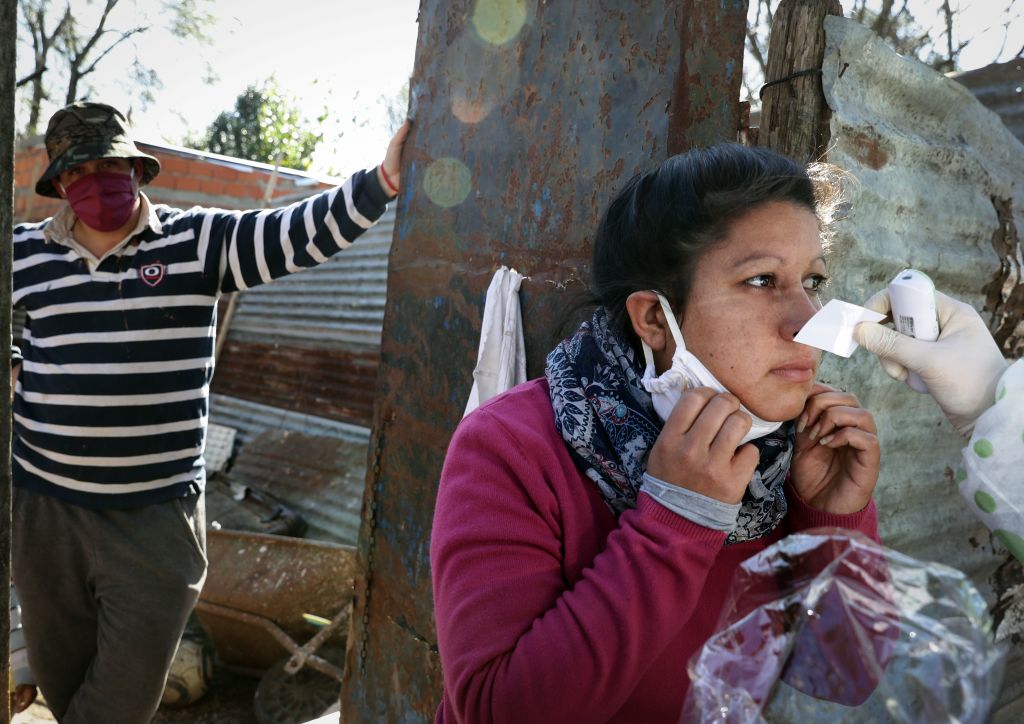COVID-19 deaths have topped 500,000, but many of the 10 million survivors are still suffering


A free daily email with the biggest news stories of the day – and the best features from TheWeek.com
You are now subscribed
Your newsletter sign-up was successful
The world hit two grim COVID-19 milestones Sunday: The number of confirmed deaths rocketed past 500,000 and the number of cases topped 10.1 million. The actual numbers are certainly higher. Half a million people dying from the new disease is self-evidently horrible, and those deaths have doubled in just seven weeks. But it's also troubling that the number of new cases is still rising — Sunday saw another 24-hour high, 189,000, according to the World Health Organization — because COVID-19 hits many survivors in long-lasting and little-understood ways.
COVID-19 attacks the lungs but also the heart, brain, pancreas, liver, kidney, and other organs. "In addition to respiratory distress, patients with COVID-19 can experience blood clotting disorders that can lead to strokes, and extreme inflammation that attacks multiple organ systems," Reuters reports. "The virus can also cause neurological complications that range from headache, dizziness, and loss of taste or smell to seizures and confusion. And recovery can be slow, incomplete, and costly, with a huge impact on quality of life."
Many patients with severe cases are still suffering from nightmarish delirium and hallucinations in the Intensive Care Unit, weeks after being released from the hospital, The New York Times reports. Dr. Igor Koralnik, chief of neuro-infectious diseases at Northwestern Medicine in Chicago, reported in the journal Annals of Neurology that about half of previously hospitalized COVID-19 patients had neurological complications like dizziness, difficulty concentrating, absence of taste and smell, and physical and mental fatigue, and it's still unclear how long these effects last or if they're permanent.
The Week
Escape your echo chamber. Get the facts behind the news, plus analysis from multiple perspectives.

Sign up for The Week's Free Newsletters
From our morning news briefing to a weekly Good News Newsletter, get the best of The Week delivered directly to your inbox.
From our morning news briefing to a weekly Good News Newsletter, get the best of The Week delivered directly to your inbox.
At the same time, "doctors increasingly are looking to the needs of patients who were not sick enough to require hospitalization, but are still suffering months after first becoming infected," Reuters reports. Oxford University's Dr. Helen Salisbury wrote Tuesday in the British Medical Journal that while most coronavirus infections resolve in two to three weeks, about 10 percent of patients experienced prolonged symptoms. For another data point, look at Sweden, the only Scandinavian country to eschew tough mitigation measures.
The Swedish research firm Novus found that in a survey of coronavirus patients, 36 percent still reported being ill 10 weeks after contracting COVID-19.
The U.S. has 125,803 confirmed COVID-19 deaths but 2.55 million cases.
A free daily email with the biggest news stories of the day – and the best features from TheWeek.com
Peter has worked as a news and culture writer and editor at The Week since the site's launch in 2008. He covers politics, world affairs, religion and cultural currents. His journalism career began as a copy editor at a financial newswire and has included editorial positions at The New York Times Magazine, Facts on File, and Oregon State University.
-
 6 gorgeous homes in warm climes
6 gorgeous homes in warm climesFeature Featuring a Spanish Revival in Tucson and Richard Neutra-designed modernist home in Los Angeles
-
 Russia’s ‘cyborg’ spy pigeons
Russia’s ‘cyborg’ spy pigeonsUnder the Radar Moscow neurotech company with Kremlin-linked funding claims to implant neural chips in birds’ brains to control their flight, and create ‘bio-drones’
-
 Political cartoons for February 8
Political cartoons for February 8Cartoons Sunday’s political cartoons include going down the drain, American history, and more
-
 Trump HHS slashes advised child vaccinations
Trump HHS slashes advised child vaccinationsSpeed Read In a widely condemned move, the CDC will now recommend that children get vaccinated against 11 communicable diseases, not 17
-
 FDA OKs generic abortion pill, riling the right
FDA OKs generic abortion pill, riling the rightSpeed Read The drug in question is a generic version of mifepristone, used to carry out two-thirds of US abortions
-
 RFK Jr. vaccine panel advises restricting MMRV shot
RFK Jr. vaccine panel advises restricting MMRV shotSpeed Read The committee voted to restrict access to a childhood vaccine against chickenpox
-
 Texas declares end to measles outbreak
Texas declares end to measles outbreakSpeed Read The vaccine-preventable disease is still spreading in neighboring states, Mexico and Canada
-
 RFK Jr. shuts down mRNA vaccine funding at agency
RFK Jr. shuts down mRNA vaccine funding at agencySpeed Read The decision canceled or modified 22 projects, primarily for work on vaccines and therapeutics for respiratory viruses
-
 Measles cases surge to 33-year high
Measles cases surge to 33-year highSpeed Read The infection was declared eliminated from the US in 2000 but has seen a resurgence amid vaccine hesitancy
-
 Kennedy's vaccine panel signals skepticism, change
Kennedy's vaccine panel signals skepticism, changeSpeed Read RFK Jr.'s new vaccine advisory board intends to make changes to the decades-old US immunization system
-
 Kennedy ousts entire CDC vaccine advisory panel
Kennedy ousts entire CDC vaccine advisory panelspeed read Health Secretary RFK Jr. is a longtime anti-vaccine activist who has criticized the panel of experts
